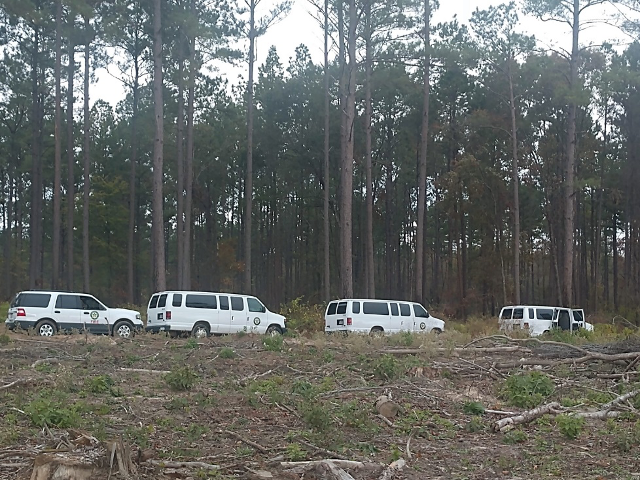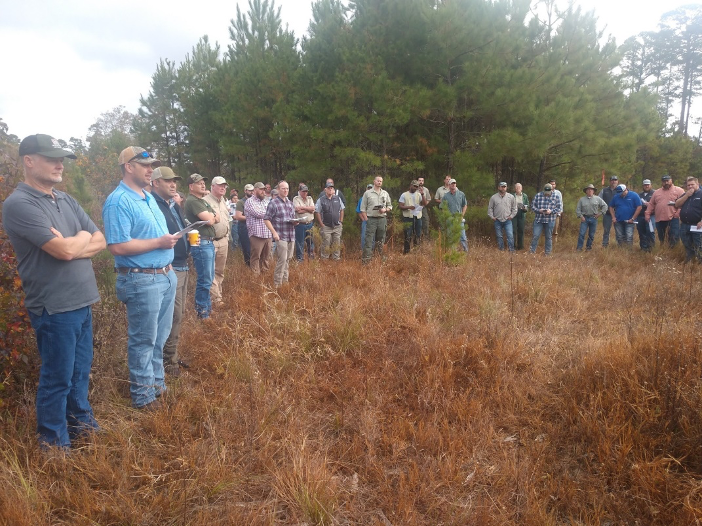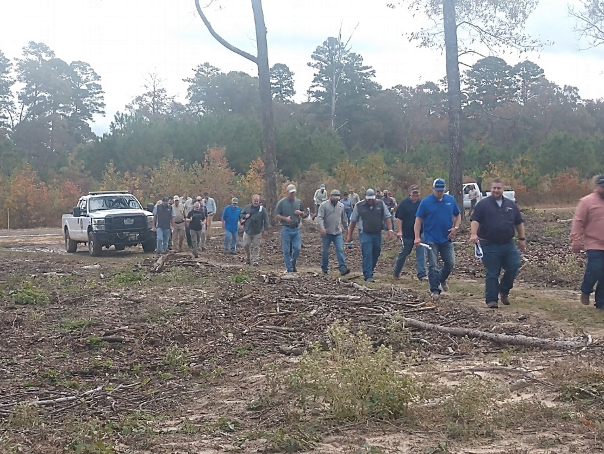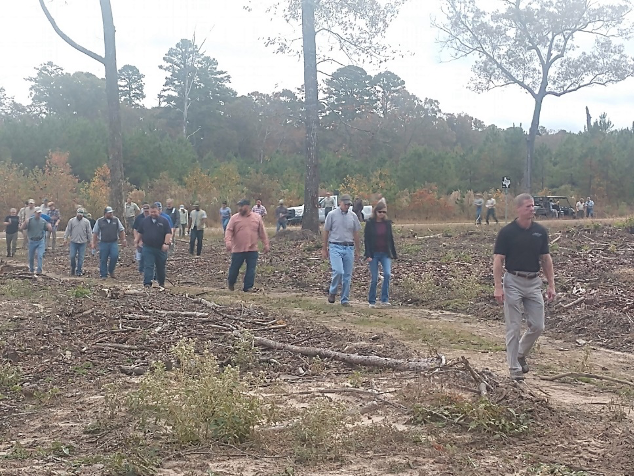East Texas Shortleaf Pine Tour A Huge Success
NE Texas Conservation Delivery Network partners convened a shortleaf pine management workshop on November 16, centered on the I.D. Fairchild State Forest in Cherokee County. The Texas A&M Forest Service’s (TFS) Jason Ellis guided nearly 80 participants on an excellent tour of past and ongoing TFS efforts on the State Forest. Highlights of the day included on-site discussions on establishing and managing young shortleaf stands. Experienced foresters and wildlife biologists described techniques and applications that have been successful, and also shared less successful applications that were learning events and should be avoided in future efforts. Mike Black, Director of the Shortleaf Initiative, provided a great deal of insight from experiences with SLP around the Southeast.
“I wish I had known then – what I know now!” Jason Ellis describing what worked and what he would have done differently in a well-established shortleaf stand.
Burning was integral in this stand’s success.
Fire and a regular use of prescribed burning were common themes throughout the day. As an essential element of shortleaf pine establishment and management, this natural ecological process ensures optimum habitat for a number of declining species and hunted species alike.
Shortleaf pine (SLP) is a species that requires practitioners to fully consider site selection. SLP should be in the right place and managed in the proper fashion. The USDA web soil survey and accompanying Ecological Site Descriptions (ESD) are a valuable tool for making the proper decisions on where and how to successfully establish shortleaf pine. The Loamy over Clayey Upland is a very common ESD at Fairchild State Forest. This ESD is described via the link below:
https://edit.jornada.nmsu.edu/catalogs/esd/133B/F133BY003TX
Efforts such as this, that share practical lessons learned and provide a safe forum for questions and discussions, are critical to translating the LMVJV’s priority bird habitat needs into positive action at scales that matter. Thanks go especially to staff of TFS, Texas Parks & Wildlife Department, and American Bird Conservancy for organization and planning.
Photos, from left to right:
Top row
Texas A&M Forest Service provided vans that were a big help to safely move field day attendees from site to site.
With over 60 landowners, biologists, foresters and Bankers in attendance; the Fairchild State Forest provided examples of how and what to do for successful shortleaf pine management. (Photo shows about half of the group.)
Tyson Hart USDA NRCS Soil Scientist explaining soil samples and the use of Web Soil Survey and Ecological Site Descriptions for successful establishment of SLP.
Middle row
TX A&M Forest Service Dr Eric Taylor leads participants through a recently harvested and site prepared area in preparation for reforestation (two photos).
Jason Ellis describing a mechanical and herbicide treatment used to prepare a stand for thinning and future development as a recruitment stand for RCW.
Bottom row
Don Dietz and Donna Work explaining why and how to manage for Red Cockaded Woodpecker (RCW).
Jason Ellis at SLP stands established through use of various techniques - traditional seedling; improvement inter-planting and seed tree natural regeneration. The site treated with prescribed fire has a well-developed herbaceous ground cover conducive to many declining wildlife species.
The Fairchild State Forest residence gathering point – a historic and classic old short leaf pine stand on an old CCC camp area.
Speakers and Experts leading the event included:
Mike Black, Director of the Shortleaf Initiative – Knoxville, TN
Rusty Wood, Dist. 6 Supervisor – Texas Parks and Wildlife
Jason Ellis, District Forester – Texas A & M Forest Service
Brian Townsend, State Forester – USDA/Natural Resources Conservation Service
Don Dietz – Wildlife Biologist & Forestry Consultant, East Texas
Tyson Hart, Ecologist – USDA/Natural Resources Conservation Service
Tyler Wayland, East Texas Natives Texas A&M, Kingsville & Pineywoods Plant Materials Center
Donna Work, Wildlife Biologist – Texas A & M Forest Service











